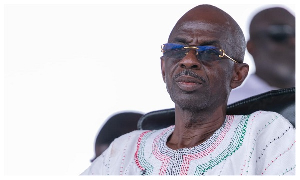A GNA Feature By Maxwell Awumah
Hohoe, May 19, GNA - The Sister Cities International (SCI) movement developed out of an idea mooted by President Dwight D. Eisenhower of the United States in 1956. It aimed at encouraging people of the world and different cultures to reach out to each other as a means of strengthening international cooperation and peace.
Today, Sister Cities is a non-profit, non-governmental network and movement of citizens and institutional partners in all countries across the world. It is based on the concept of a grassroots "people-to-people" approach to international relations as a supplement to "Government-to-Government" international relations.
To date, there are 2,400 Sister Cities relationships formally registered worldwide. Sister Cities International which is incorporated and headquartered in Washington DC, is the apex organization of the movement. Besides the apex organization are Sister City Foundations for each continent, i.e. Africa Global Sister Cities Foundation (AGSCF), which is now charged with promoting SCI's goals and activities in Africa, with Mr Prince Kwame Kludjeson, being the Africa-President and the Country Co-ordinator of Ghana-SCI.
The underlying objective of the Sister Cities Program is the promotion of international friendship to create and strengthen long term partnership between citizens of cities in the world by motivating and empowering private citizens, their municipal officials and business leaders to dialogue and engage with other cities and their citizens in peace and understanding.
Ghana, which is a member of the United Nations and other peace - seeking organizations of the world, shares the goal of the Sister Cities International.
The Ghana Sister Cities Foundation continues to facilitate the twinning of their district to cities abroad. As a result, the number of Sister Cities in Ghana today had increased from 10 in 2003 to 15 last year with the latest being the twinning of Agogo Traditional Area to Fort Lauderdale in Florida, United States. In this vain, Hohoe District is equally making effort to have its district twinned with West Palm Beach in the US.
It is gratifying to note that during last year's Sister Cities International Annual Conference held in Fort Worth, Texas, Tamale and the City of Louisville in Kentucky, US, were adjudged the best Sister Cities for 2004. This feat was achieved when the two cities jointly undertook a project on women empowerment and poverty alleviation. To survive a taste of time, an established Sister City relationship requires the formation of a local Sister City Committee comprising a broad range of community members as well as the election of local officers to steer its affairs.
This way, all sectors of the community can actively participate in its programmes, thus promoting citizen diplomacy from the grassroots level.
By fostering international understanding, friendship and encouraging exchange of education, culture and sport through Sister Cities would help to support tourism and trade. Such contacts are estimated to have brought billions of dollars to the world's economy mainly at the grassroots level.
The hope is that sister city relationships will help people from different countries to understand each other better and use them as a way to build trust, understand new cultures and explore business relationships.
The Sister City concept therefore has become an excellent catalyst for economic growth and delegations visiting twinned cities add to the local tourism market, especially eco-tourism attraction sites, which the country abounds in such as the Wli water falls, Tafi-Atome Monkey Sanctuary, the great Mount Afadjato which is the highest mountain in Ghana, the mysterious Seven-Branch Palm Tree at Leklebi Agbesia, the caves, just to mention a few.
This type of tourism, although has been around for decades, is becoming more and more popular as more tourists are getting addicted to choosing sites where they could experience the beauties of the natural world while learning more about 'mother nature'.
Undisputedly, eco-tourism is still only a small sector, yet it is growing rapidly as more and more tourists want to learn and participate in the natural, cultural and social worlds they visited. This is an area of tourism that we all need to support and encourage, apart from the financial aspect, the social and environmental impacts gained from caring and learning about the environment are priceless.
By encouraging these type of travellers and providing a world class, sustainable visitor-experience, we would be preserving the natural assets that the country is famous for and create unity between our people and communities worldwide through Sister Cities affiliations. From the foregoing, the Africa Global Sister Cities Foundation had therefore taken a challenge to establish and host an international website for all districts, selected communities and traditional areas in Ghana to showcase their investments and tourism potentials to attract the yearning international community through Sister Cities affiliations to facilitate socio-economic development of the country.
INVITATION TO AFFILIATE
This year's Sister Cities conferences, which are scheduled from May 25-28 and July 27-31, would be held in St. Louis, Missouri and Spokane in Washington D.C respectively.
Interested Metropolitan, Municipal and District Assemblies (MDDAs) as well as corporate and business entities, traditional areas and communities could sponsor delegates to the confab and explore avenues of twinning to a city or business, as the benefits are enormous. For instance, Egypt, which had harnessed and sustained its tourism potentials, is reaping billions of dollars from the sector while Agogo had also benefited from over 1.3 dollars from the SCI.
Consequently, Metropolitan, Municipal and District Assemblies should inculcate the Sister City concept into their development programmes by setting aside some proportion of their budgets for the operations of their local SCI programmes.
By so doing, we would be increasing global co-operation at the local level, fostering cross-cultural understanding and stimulating economic development while building bridges of hope and peace between communities and their international counterparts. As per the SCI 2004 membership directory, there were 96 Africa Cities, municipalities, districts in partnership with Sister Cities in the US. These Africa partners have been in Sister cities relationships for varied periods of time and have various experiences to narrate with regards to their benefits from the programme. Possible areas of collaboration in the SCI/AGSCF were the arts and culture, business and economic development, education, environmental awareness, disability awareness, healthcare assistance, Public safety, training, youth activities and humanitarian relief among others.
DOMESTICATION OF THE CONCEPT
The SCI concept, when domesticated, would go a long way to enhance its actualisation in the country.
The country is at the crossroad of placing Ghana on the international tourism map and it behoves on all stakeholders to ensure that tourism becomes the mainstay of the economy.
Opinions of Thursday, 19 May 2005
Columnist: GNA
Sister cities concept - a recipe to consolidate tourism
Entertainment













